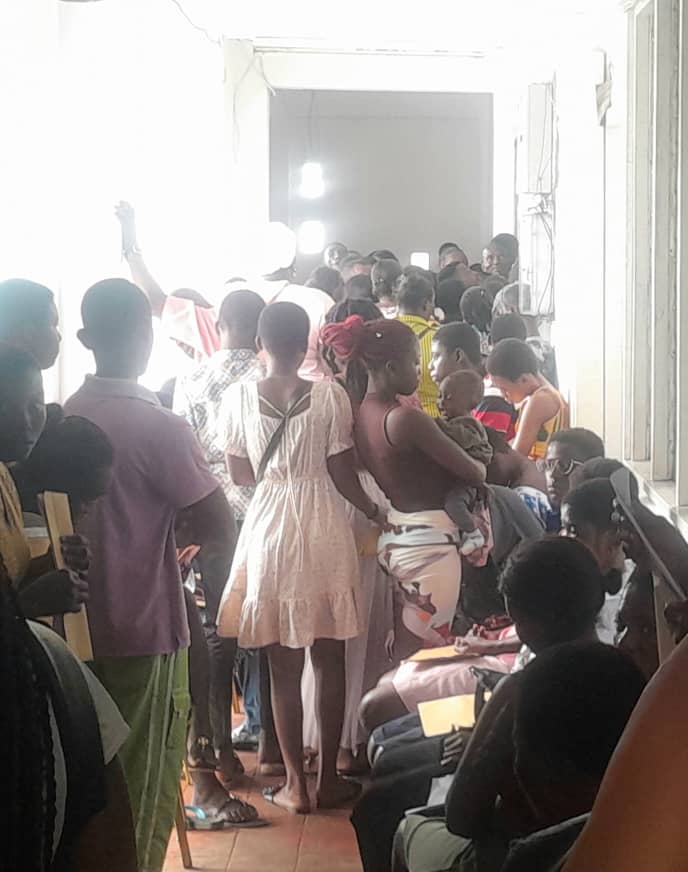The recent release of the 2025 Free Senior High School (SHS) placements in Ghana has triggered a wave of anxiety and frustration among parents, guardians, and prospective students, leading to chaotic scenes at the SHS Secretariat in Cape Coast. The Secretariat, located at the Central Regional Coordinating Council (CRCC), has been overwhelmed by the sheer number of individuals seeking redress for various placement-related challenges. Long queues snake through the corridors as people jostle for attention, desperate to have their concerns heard and addressed. The primary reasons for these appeals range from requests for school changes due to distance, financial constraints, and perceived inadequacy of resources in assigned schools, to adjustments in residential status. The situation underscores the complex interplay of factors influencing school choice and the significant emotional and logistical burdens placed upon families navigating the placement system.
The official release of the placements on September 18, 2025, by the Ghana Education Service (GES), with a stipulated reporting date of October 18, 2025, has done little to quell the rising tide of discontent. Parents express frustration with the seemingly arbitrary nature of the placements and the arduous process of seeking resolution. Many feel their children’s academic achievements and personal circumstances have not been adequately considered, leaving them with placements that seem ill-suited to their needs and aspirations. The prevailing sense of urgency is palpable, as families grapple with the looming deadline and the fear of their children being disadvantaged by attending schools perceived as less desirable. This has led to a surge in demand for intervention at the Secretariat, further exacerbating the already strained resources and logistical challenges.
Individual narratives paint a vivid picture of the challenges faced by families. Mr. Emmanuel Kingsford, for example, highlights the agonizing wait times and the perception of preferential treatment at the Secretariat. His experience, shared by many others, underscores the frustration of navigating a bureaucratic system perceived as unresponsive and inefficient. Mr. Yaw Mensah’s case illustrates the predicament of families facing long commutes and financial burdens associated with day student placements in distant schools. His daughter’s placement at Assin Manso, despite a commendable aggregate score of 15, presents him with the dilemma of either incurring significant travel costs or finding alternative accommodation, a burden many families simply cannot afford.
Madam Mary Hayford’s story further exemplifies the disconnect between student achievement and school allocation. Despite her daughter’s aggregate score of 11, she was placed at Jukwa SHS, a school Madam Hayford believes lacks the resources to adequately support her daughter’s pursuit of a General Science curriculum. Her preference for better-resourced institutions like Holy Child or Ghana National College highlights the critical role of resource availability in shaping parental preferences. The disparity between perceived school quality and student achievement underscores the need for a more equitable distribution of resources and a more transparent placement process that takes into account individual academic potential.
Master John Hoya Senior’s situation adds another layer to the complexity of the placement challenges. His placement at Assin Manso as a boarding student, while potentially offering a higher quality education, conflicts with his family’s financial constraints and his desire to contribute to the household. His request to transfer to Cape Coast Technical School as a day student reflects a practical need to balance educational aspirations with familial responsibilities. This highlights the crucial role of considering socio-economic factors in the placement process to ensure that placements are not only academically appropriate but also financially viable for families.
In response to the growing outcry, the GES has established solution centers across all districts in the Central Region, aiming to decentralize the process and provide more accessible avenues for redress. However, the effectiveness of these centers remains to be seen, as evidenced by the low number of complaints received and resolved at the regional center in Cape Coast. The contrast between the overwhelming crowds at the Secretariat and the relative inactivity at the solution centers suggests a disconnect in communication and public awareness. The GES faces the critical task of effectively publicizing the availability and function of these centers to ensure that families are aware of alternative channels for resolving their placement concerns. Furthermore, the GES must streamline the complaint resolution process to ensure efficiency and responsiveness, addressing the concerns of parents and students in a timely and effective manner. The current situation calls for a comprehensive review of the placement system, incorporating feedback from families and stakeholders to create a more equitable and transparent process that better serves the needs of all Ghanaian students.


